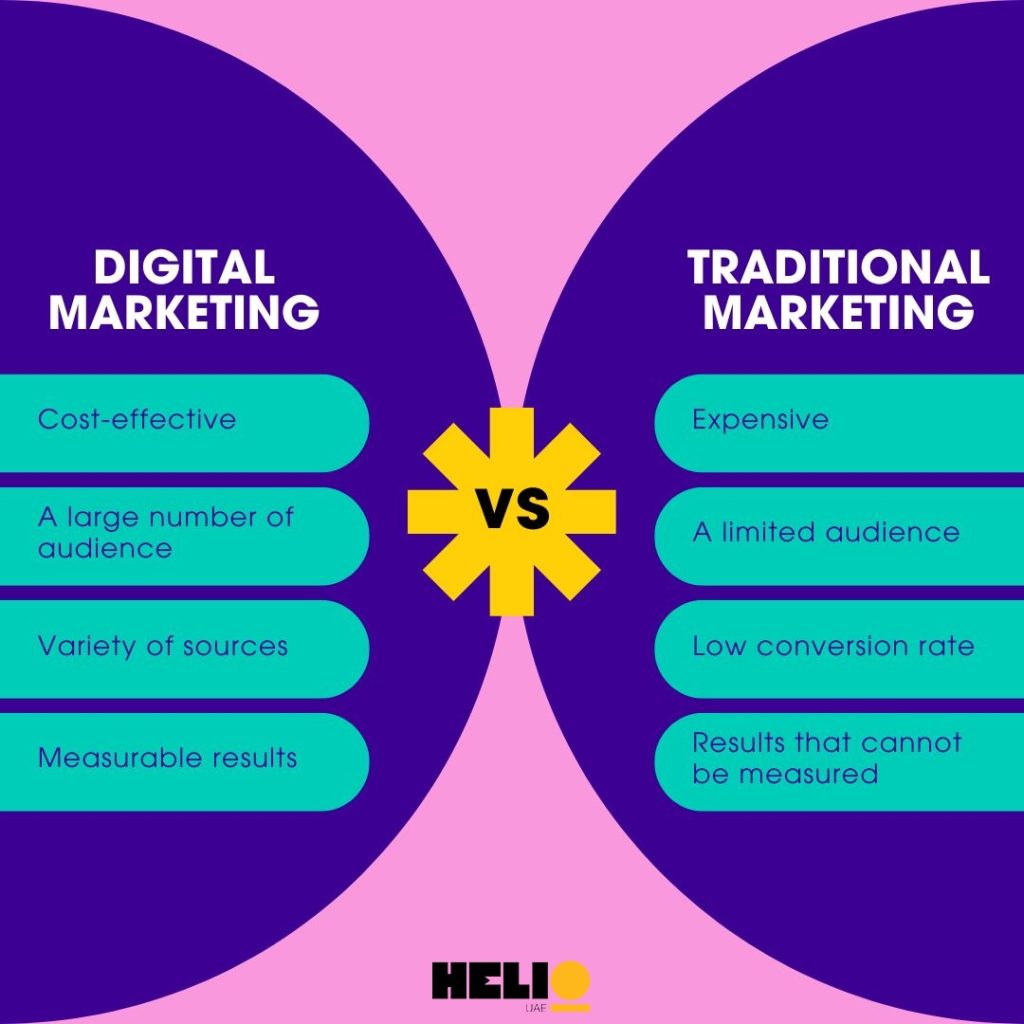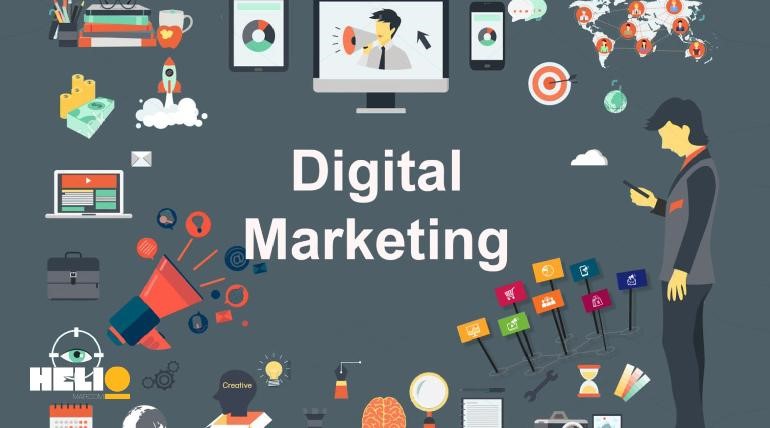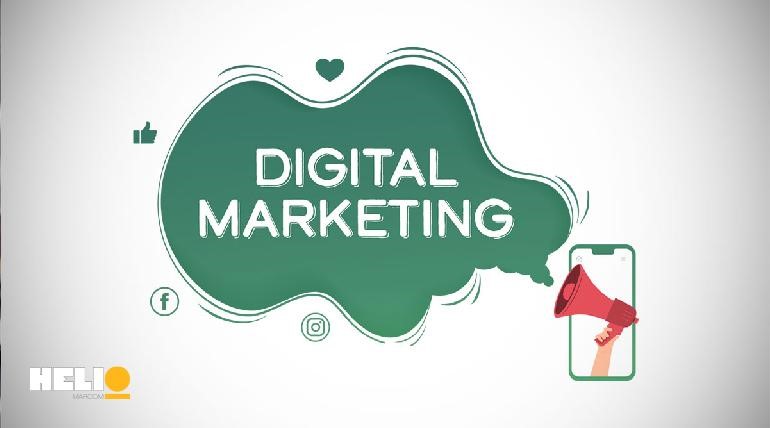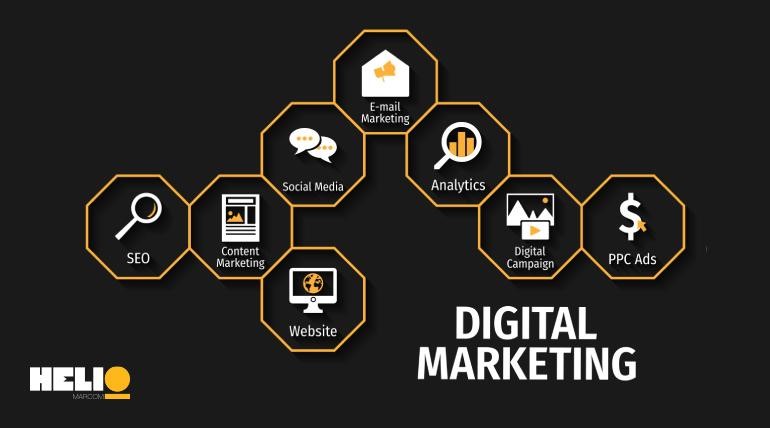Listen to this blog post:
Welcome to this comprehensive guide on digital marketing, which was brought to you by the Helio digital marketing department. In this guide, we will delve into the intricacies of digital marketing, exploring its various types and providing practical examples.
Whether you’re a seasoned marketer looking to refine your strategies or a novice aiming to understand the fundamentals, this guide is designed to equip you with the knowledge and tools necessary to succeed in the digital landscape. Join us as we navigate through the foundational aspects of digital marketing and uncover the best practices for achieving impactful marketing campaigns.
What is Digital Marketing?
Digital marketing encompasses all marketing efforts that utilize the Internet or electronic devices. For those wondering, “What is digital marketing for beginners?” It involves businesses leveraging digital channels such as search engines, social media, email, and websites to connect with current and prospective customers.
It’s a dynamic field that combines creativity with analytical precision to build brand awareness, drive engagement, and ultimately generate revenue.
Evolution of Digital Marketing
The roots of digital marketing can be traced back to the advent of the Internet in the 1990s. The landscape has since transformed rapidly, from simple banner ads to sophisticated data-driven campaigns. Key milestones include the introduction of search engines, the rise of social media platforms, and the proliferation of mobile technology, which have reshaped how brands communicate with their audiences.
Importance in Today’s Business Landscape
In a digitally connected world, digital marketing is indispensable. It offers unparalleled reach and provides businesses the tools to engage with a global audience. Digital marketing not only levels the playing field for small businesses but also provides established brands with innovative ways to strengthen their market presence.

How Digital Marketing Works and What is the Use of Digital Marketing
Digital marketing operates on the premise of reaching the right audience at the right time with the right message. By utilizing a variety of digital channels and techniques, businesses can target their ideal customers and tailor their messaging to maximize impact.
Traditional Marketing vs. Digital Marketing
Traditional marketing relies on mediums such as print, radio, and television. In contrast, digital marketing leverages online platforms and technologies to deliver targeted messages. The ability to track, analyze, and optimize campaigns in real time differentiates digital marketing, making it a more flexible and efficient approach.
Shift to Online Platforms
Consumer behavior has driven the shift from traditional to digital marketing. With more people spending time online, businesses have had to pivot to meet their audience where they are. This transition has opened up new opportunities for personalized and interactive marketing experiences.
Impact of New Technologies and Trends
Emerging technologies like artificial intelligence, augmented reality, and big data analytics are revolutionizing digital marketing. These advancements enable more precise targeting, predictive analysis, and immersive experiences that engage consumers in novel ways.
Types of Digital Marketing Channels
To know what online marketing is all about, you need to understand the different digital marketing channels available. Each channel offers unique opportunities for reaching and engaging with your target audience. Here is an overview of some of the most popular digital marketing channels:
1. Website Marketing
A business’s website is its digital storefront. Effective website marketing involves optimizing site design, content, and functionality to convert visitors into customers. This can include SEO strategies, user experience (UX) enhancements, and engaging multimedia content.
2. Pay-Per-Click Advertising
PPC advertising allows businesses to place ads on search engines and pay only when their ad is clicked. Platforms like Google Ads enable precise targeting based on keywords, demographics, and user behavior, making it a cost-effective way to drive traffic.
3. Content Marketing
Content marketing focuses on creating valuable, relevant content to attract and retain a target audience. Blog posts, videos, and infographics are standard formats. For instance, a specialized industry like aviation can benefit significantly from tailored content strategies. Digital marketing for aviation, for example, involves leveraging these channels to promote flight services, streamline ticket bookings, and engage frequent travelers effectively.
4. Email Marketing
Email marketing remains one of the most effective channels for nurturing leads and maintaining customer relationships. Personalized email campaigns can deliver tailored content, special offers, and updates directly to a user’s inbox, fostering long-term engagement.
5. Social Media Marketing
Social media platforms like Facebook, Instagram, LinkedIn, and Twitter offer powerful tools for brand building and customer interaction. Effective social media marketing involves creating shareable content, engaging with followers, and leveraging paid advertising options to extend reach.
6. Affiliate Marketing
Affiliate marketing involves partnering with other businesses or individuals to promote products or services in exchange for a commission on sales. This performance-based strategy can expand a brand’s reach and drive revenue through trusted referrals.
7. Video Marketing
Video marketing leverages platforms like YouTube, Vimeo, and social media to share engaging video content. This can include product demonstrations, tutorials, customer testimonials, and live streams, all designed to capture attention and drive action.
8. Text Messaging
SMS marketing lets businesses send promotional messages directly to customers’ mobile devices. This channel is particularly effective for time-sensitive offers, event reminders, and customer support interactions.

Key Performance Indicators (KPIs) in Digital Marketing
Businesses can track various KPIs to measure the success of digital marketing efforts. These metrics provide insights into campaign performance and inform future strategies. Some common KPIs include:
1. Click-through Rate
CTR measures the percentage of users who click on an ad or link out of the total who view it. High CTR indicates effective ad placement and relevance.
2. Conversion Rate
The conversion rate tracks the percentage of visitors who complete a desired action, such as purchasing or filling out a form. It’s a critical metric for assessing campaign success.
3. Social Media Traffic
This KPI measures the traffic driven to a website from social media platforms. It helps gauge the effectiveness of social media marketing efforts.
4. Website Traffic
Overall website traffic includes all visitors to a site. Analyzing traffic sources, behavior, and trends provides insights into the effectiveness of various marketing strategies.
| Category | Description |
|---|---|
| SEO (Search Engine Optimization) | Optimizing websites to rank higher on search engines and increase organic traffic. |
| Social Media Marketing | Building brand presence and engaging audiences on platforms like Facebook, Instagram, and LinkedIn. |
| PPC Advertising | Using paid ads to drive targeted traffic to websites and landing pages. |
| Content Marketing | Creating valuable and relevant content such as blogs, videos, and infographics to attract and retain customers. |
| Email Marketing | Sending personalized email campaigns to nurture leads and boost customer retention. |
| Why Digital Marketing Matters | Provides real-time insights, cost-effective strategies, targeted engagement, brand credibility, and increased conversions. |
Challenges in Digital Marketing
While digital marketing offers many benefits, it also presents unique challenges. Some of the most common include:
Rapid Proliferation of Digital Channels
The ever-expanding digital landscape challenges managing and optimizing multiple channels simultaneously. Staying abreast of trends and technological advancements is crucial.
Data Analysis and Utilization
With vast amounts of data available, extracting actionable insights can be daunting. Practical data analysis tools and techniques are essential for making informed decisions.
Capturing Consumer Attention
In a crowded digital space, capturing and retaining consumer attention requires creativity, relevance, and strategic targeting. Standing out demands continuous innovation and value-driven content.

What are Digital Marketing Agencies
Given the complexities of digital marketing, many businesses turn to specialized agencies for support. Digital marketing agencies provide various services, from strategy development to campaign execution and analytics. Working with an agency can help businesses navigate the ever-changing digital landscape and achieve their marketing goals.
Role of Digital Marketing Agencies
Digital marketing agencies specialize in crafting and executing comprehensive marketing strategies. They bring expertise in various channels, technologies, and best practices to help businesses achieve their goals.
Services Offered
Services typically include SEO, PPC, content creation, social media management, email marketing, and analytics. Agencies provide a holistic approach to digital marketing, ensuring all aspects work in harmony.
Importance for Businesses
Partnering with a digital marketing agency can save time, reduce costs, and improve results. Agencies offer the expertise and resources needed to navigate the complexities of digital marketing effectively.

Exploring SEO in Digital Marketing
Search Engine Optimization (SEO) is improving a website’s visibility and ranking on search engine result pages. It involves optimizing content, structure, and coding to make it easier for search engines to understand and index a site.
Search engine optimization (SEO) involves optimizing a website to rank higher in search engine results pages (SERPs). Higher visibility drives organic traffic and enhances credibility.
Techniques and Strategies
SEO strategies include keyword research, on-page optimization, link building, and technical SEO. Regularly updating content and adhering to best practices are critical to maintaining and improving rankings.
Impact on Website Visibility
Effective SEO can significantly increase a website’s visibility, attracting more visitors and potential customers. It’s a long-term investment that pays dividends in sustained traffic and brand recognition.
Differentiating Internet Marketing from Digital Marketing
Internet marketing and digital marketing are often used interchangeably, but they differ! Internet marketing focuses solely on online channels, while digital marketing encompasses online and offline tactics.
Channels Used in Internet Marketing
Internet marketing leverages various online channels, including websites, search engines, social media, email, and mobile apps. It’s primarily focused on driving website traffic and conversions.
Extending Beyond Online Platforms in Digital Marketing
Digital marketing extends beyond internet channels, including offline tactics such as TV and radio advertisements, billboards, and print media. It aims to create a seamless customer experience across all touchpoints.
Importance for Businesses
Both internet and digital marketing play essential roles in promoting businesses online. However, understanding the differences can help companies to create more comprehensive marketing strategies and reach a broader audience. So, it’s crucial to carefully evaluate which channels will be most effective for achieving specific goals and target audiences. This requires ongoing analysis, adaptation, and innovation to keep up with the ever-changing digital landscape.

Becoming a Digital Marketer
Becoming a successful digital marketer requires a combination of skills, knowledge, and experience. Some key attributes include:
Technical Skills
Digital marketers must have technical proficiency in SEO, paid search, and analytics. Familiarity with web development and coding is also beneficial.
Analytical Abilities
Data analysis is crucial for understanding the effectiveness of marketing campaigns and making informed decisions. Digital marketers must be able to interpret data accurately.
Creativity and Innovation
With millions of online businesses competing for consumers’ attention, creativity and innovation are essential for standing out. Marketers must continuously generate fresh ideas to engage audiences effectively. This is where creative concept development plays a crucial role, allowing businesses to craft unique campaigns that resonate with their target audience and leave a lasting impression.
Digital marketing offers numerous benefits for businesses looking to reach their target audience through various online channels. However, it requires a deep understanding of the ever-evolving digital landscape and a combination of technical skills, analytical abilities, and creativity. Partnering with a specialized agency like Helio can help businesses navigate this complex world and achieve their marketing goals effectively.
Essential Skills in Digital Marketing
As digital marketing continues to evolve, specific skills are essential for success in the field. These include:
Content Creation and Storytelling
Creating compelling and relevant content is crucial for engaging and retaining consumers’ attention. Telling a story that resonates with your audience can significantly impact their perception of your brand.
Social Media Management
Social media platforms provide powerful channels for businesses to connect with their target audience. Digital marketers must deeply understand each platform’s nuances and how to leverage them effectively.
Data Analysis and Interpretation
With an abundance of data available, it is vital to analyze and interpret it accurately. This allows digital marketers to measure campaign effectiveness, identify areas for improvement, and make informed decisions.

Adaptability and Flexibility
As technology and consumer behavior continue to change rapidly, digital marketers must be adaptable and flexible. This allows them to pivot quickly when necessary and stay ahead of the curve in a constantly evolving industry.
Digital marketing is a critical component of any business’s overall marketing strategy. It allows businesses to reach their target audience through various online channels and drive results cost-effectively.
Understanding Implicit Bias in Digital Marketing
Implicit bias refers to the unconscious attitudes, stereotypes, and beliefs that influence our perceptions and behavior toward certain groups of people. In digital marketing, implicit bias can manifest in various ways:
Targeting Specific Demographics
Digital marketers may unconsciously target specific demographics based on their own biases rather than considering the interests and needs of a diverse audience.
Lack of Representation in Advertising
Representation matters, and when certain groups are consistently underrepresented or misrepresented in advertising, it can perpetuate implicit biases.
Limited Perspective in Campaigns
When creating campaigns, it’s essential to consider diverse perspectives and avoid homogenizing messages that may exclude or alienate certain groups.
As digital marketers, we must be aware of our implicit biases and actively work to eliminate them in our campaigns and strategies. This not only leads to more inclusive and effective marketing but also contributes to a more equitable society. Regularly evaluating our biases and staying open to diverse perspectives, we can create more meaningful connections with our target audience and drive positive change through digital marketing.
Elevate Your Digital Marketing Strategy with Helio
Digital marketing is an essential component of modern business strategy. Its diverse channels, data-driven insights, and dynamic nature make it a powerful tool for achieving business objectives.
Staying ahead in digital marketing requires continuous learning and adaptation. Mastery of digital marketing techniques enables businesses to thrive in a competitive landscape.
Emerging technologies and evolving consumer behaviors will shape the future of digital marketing. Staying informed and agile will be vital to leveraging new opportunities and maintaining a competitive edge. If you need more information about digital marketing cost in dubai ; we would be wondering answer you.
Are you looking to elevate your digital marketing strategy? Let Helio provide top-notch digital marketing solutions and help you build a solid online presence.





